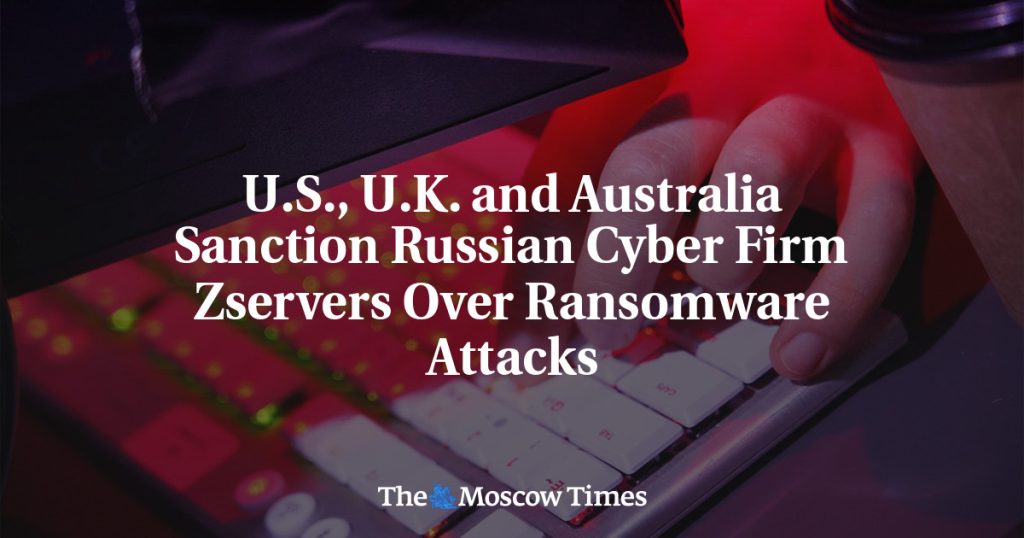Coordinated Sanctions Target Russian Cyber Firm for Role in Global Ransomware Attacks
1. Introduction: A Global Crackdown on Cybercrime
In a significant move to combat the growing threat of cybercrime, the United Kingdom, the United States, and Australia jointly announced sanctions against a Russian cyber firm, Zservers, and several of its employees on Tuesday. The sanctions allege that Zservers and its staff have been instrumental in facilitating devastating ransomware attacks worldwide. This coordinated effort marks the latest in a series of actions by Western nations to dismantle the infrastructure supporting malicious cyber activities, particularly those originating from Russia.
The sanctions are part of a broader strategy to disrupt the operations of ransomware groups, which have become a major threat to global security and economic stability. Ransomware attacks, which involve encrypting a victim’s data and demanding payment for its release, have targeted everything from hospitals and schools to Critical infrastructure and private businesses. By targeting Zservers, the three nations aim to disrupt the supply chain that enables these attacks, including the provision of infrastructure and technical support to cybercriminals.
2. The Role of Zservers in the Global Cybercrime Ecosystem
According to the UK Foreign Office, Zservers is accused of providing "vital infrastructure for cybercriminals as they plan and execute attacks against the U.K." The firm is alleged to be part of a Russian cybercrime syndicate that has played a significant role in enabling ransomware attacks globally. Six employees of Zservers have also been sanctioned for their involvement in this "prolific cybercrime supply chain."
In addition to Zservers, the UK has targeted a UK-based front company, XHOST Internet Solutions, which is believed to have ties to the Russian cybercrime network. This move highlights the international nature of cybercrime and the need for cross-border cooperation to combat it. By targeting both the Russian firm and its alleged UK affiliate, the sanctions aim to sever the links between cybercriminals and their global infrastructure.
3. A History of Cybercrime: Previous Sanctions and the Ongoing Battle
The sanctions against Zservers and its employees are not an isolated incident but rather part of a larger pattern of Western nations taking action against Russian cybercriminals. In the past year, the UK, US, and Australia have collectively targeted notorious ransomware groups such as LockBit and Evil Corp. These groups have been responsible for extorting billions of dollars from thousands of victims worldwide, including hospitals, schools, and businesses.
In May, the three nations imposed sanctions on the leader of the LockBit ransomware outfit, accusing him of masterminding a global extortion campaign. The latest sanctions against Zservers and its employees build on this effort, further targeting the infrastructure and individuals that support these malicious activities. By continually updating their sanctions lists, the Western allies aim to disrupt the financial networks and operational capacity of cybercriminals.
4. The LockBit Connection and the Broader Implications
The US specifically highlighted Zservers’ role in supporting LockBit ransomware attacks, sanctioning two Russian employees for their involvement. LockBit has been one of the most active and destructive ransomware groups in recent years, targeting organizations across the globe. By sanctioning individuals and entities linked to LockBit, the US and its allies hope to disrupt the group’s operations and deter others from engaging in similar activities.
The sanctions also underscore the broader challenge posed by Russia’s cyber underworld. UK Foreign Secretary David Lammy accused Russian President Vladimir Putin of presiding over a "corrupt mafia state driven by greed and ruthlessness," where cybercriminals operate with impunity. Lammy emphasized that the targeting of Zservers and its employees is part of a broader strategy to constrain the Kremlin’s ability to support or profit from cybercrime.
5. The Russian Response and the Ongoing Geopolitical Tensions
While the sanctions are intended to weaken the Russian cybercrime ecosystem, they also highlight the ongoing geopolitical tensions between Russia and the West. Russia has consistently denied allegations of state involvement in cybercrime, dismissing them as part of a broader smear campaign. However, Western officials argue that the prevalence of cybercriminal groups operating from Russian soil suggests a lack of meaningful action by the Kremlin to address the issue.
The sanctions against Zservers and its employees are likely to escalate tensions further, as Russia views such measures as an attack on its sovereignty. However, the Western allies remain committed to their approach, framing it as a necessary response to protect their citizens and businesses from the growing threat of cybercrime.
6. The Broader Impact and the Fight for Press Freedom in Russia
The sanctions against Zservers also draw attention to the broader context of press freedom in Russia, where independent journalism is under increasing threat. The Moscow Times, an independent news outlet, has faced significant challenges, including being labeled an "undesirable" organization and a "foreign agent" by the Russian government. These designations effectively criminalize their work and put their staff at risk of prosecution.
In a message to its readers, The Moscow Times emphasized its commitment to providing accurate and unbiased reporting, despite the challenges posed by the Russian government. The outlet has called on its readers for support, highlighting the importance of independent journalism in holding power to account. The sanctions against Zservers serve as a reminder of the broader struggle for transparency and accountability in Russia, where both cybercriminals and independent journalists operate in a complex and often hostile environment.
In conclusion, the sanctions against Zservers and its employees represent a significant step in the global fight against cybercrime. By targeting the infrastructure and individuals that enable ransomware attacks, the UK, US, and Australia hope to disrupt the operations of cybercriminals and deter future attacks. However, the broader context of geopolitical tensions and the ongoing struggle for press freedom in Russia underscores the complexity of this issue. As cybercrime continues to evolve, international cooperation and a unwavering commitment to transparency and accountability will remain essential in the fight against this growing threat.












